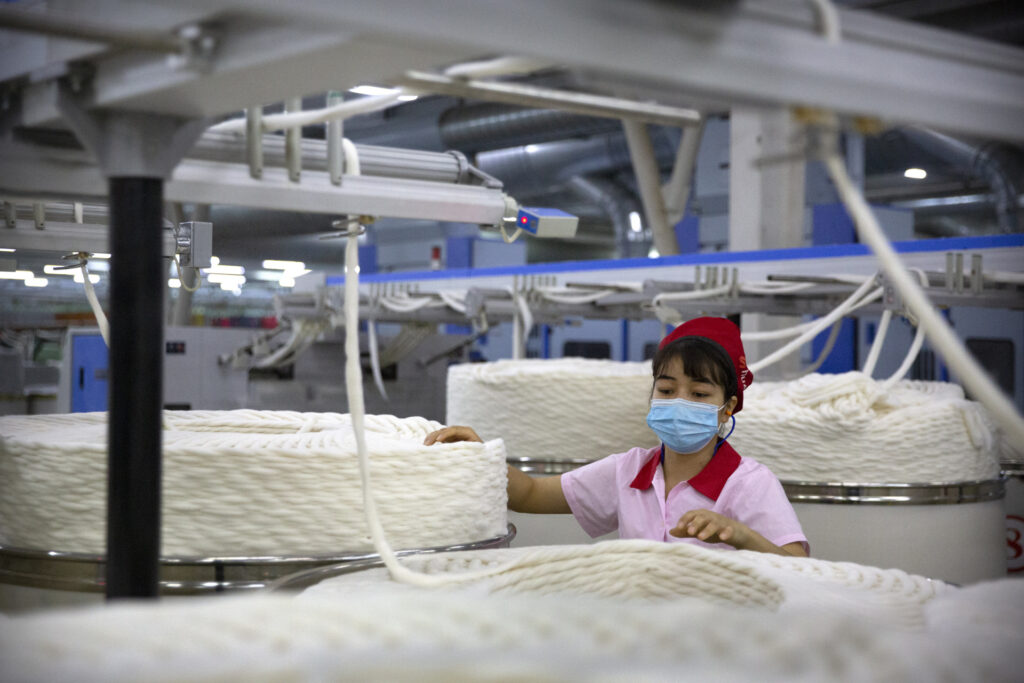
The Canadian Ombudsman for Responsible Enterprise (CORE) announced on Thursday it is investigating the Canadian branches of Walmart, Hugo Boss, and Diesel for the alleged use of Uyghur slavery in their supply chains.
CORE is a human rights watchdog agency whose purview includes human rights abuses along international supply chains connected to corporations in Canada. CORE can act on both referrals and its own initiative.
In this case, CORE acted on allegations from human rights groups that Chinese suppliers for the three firms used slaves from the oppressed Uyghur Muslims of East Turkistan, which China calls Xinjiang.
Forced labor contamination is an especially pernicious problem in the garment industry since China provides a great deal of the world’s cotton, and Xinjiang produces almost 90 percent of China’s supply.

Workers remove, by hand, impurities such as leaves from cotton fibers on October 26, 2005, in the Xinjiang Uyghur Autonomous Region city Turpan, China. (Chien-min Chung/Getty Images)
CORE’s ombudsman and chief spokeswoman, Sheri Meyerhoffer, said Friday that Walmart, Hugo Boss, and Diesel all refused to participate in a preliminary assessment of the slavery reports, so her agency had no choice but to launch an investigation:
The investigations will provide all three companies with an ongoing opportunity to provide further relevant information, and mediation of the allegations remains open. We are hopeful that the investigation findings will provide the companies with information to support their ability to strengthen their due diligence practices.
All three companies denied they purchased goods tainted by forced labor.
A spokesperson for Hugo Boss said the company “does not source any goods in its direct supply relationship that originate from the Xinjiang region.”
“As a matter of principle, we do not tolerate forced or compulsory labor or any form of modern slavery. We believe it is wrong to launch an investigation based on an alleged supplier relationship which no longer exists,” the spokesperson said, alluding to a relationship with a supplier that ended in 2022.
Hugo Boss was among several brands that purchased cotton from the Changji Esquel Group, a massive Chinese supplier that made efforts to conceal its sourcing of cotton from Xinjiang. When human rights groups exposed Esquel’s practices, some of its clients terminated their relationships. Hugo Boss initially said it had audited Esquel’s operations and found no trace of slavery, but in February 2022, it quietly severed its ties with the Chinese supplier.
According to a report at JustStyle on Friday, the coalition of human rights groups that complained to CORE said there is “evidence that the company linked to Hugo Boss Canada owns a subsidiary in Xinjiang, purchases Xinjiang cotton, engages in state-sponsored labor transfers, and purchases cotton from a Xinjiang based cotton provider.”

A worker watches as a machine processes cotton yarn at a Huafu Fashion plant, as seen during a government-organized trip for foreign journalists in Aksu in western China’s Xinjiang Uyghur Autonomous Region on April 20, 2021. (AP Photo/Mark Schiefelbein)
Diesel, an Italian-owned fashion company, purchased garments from a company called Jiangsu Guotai Guosheng, which allegedly employs Uyghur slaves. Walmart was accused of doing business with a half-dozen companies under suspicion of using slavery, including Jiangsu Guotai Guosheng.
Diesel said in response to the CORE investigation:
Diesel is deeply committed to ethical sourcing. We respect global human rights and comply with international laws across our supply chain. We take immediate remedial and disciplinary action if we find that any supplier is not acting in accordance with our code of conduct.
Walmart Canada likewise said it “does not tolerate forced labor of any kind” in its supply chain and takes “allegations of human rights violations seriously”:
Walmart made it clear to the CORE that we have developed and executed policies, standards, controls, and supply chain monitoring systems that support Walmart Canada’s corporate mandate to prohibit the use of forced labor. Our policies are diligently enforced.
CORE replied that Diesel’s refusal to participate in preliminary assessments raised “questions related to the degree of transparency in its human rights due diligence practices,” while Hugo Boss “does not appear to consider fully the complex nature of the garment supply chain.”







